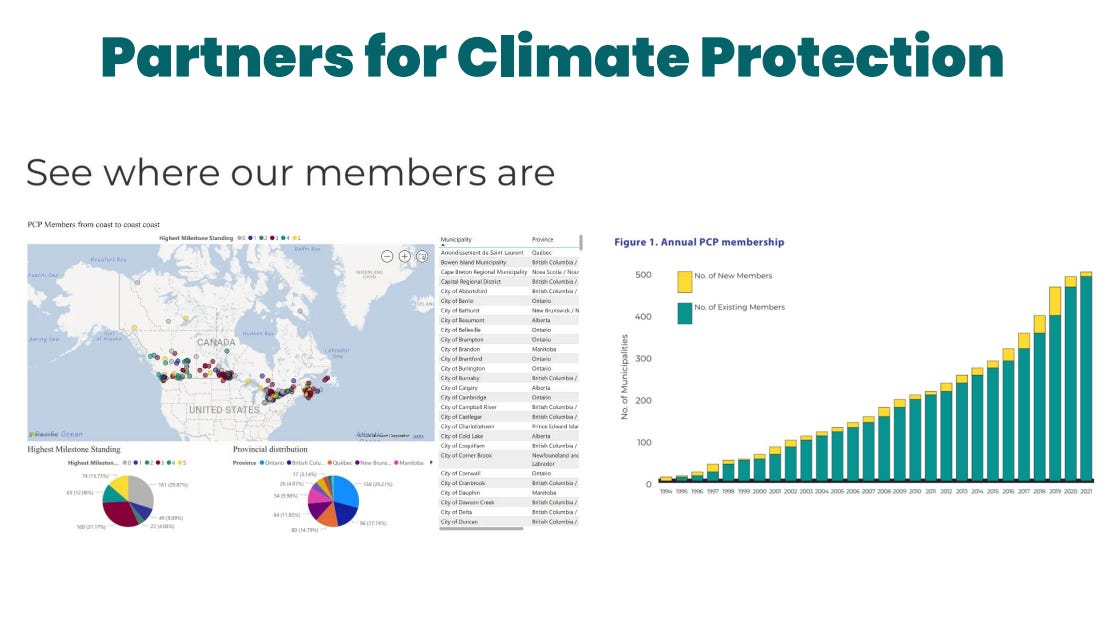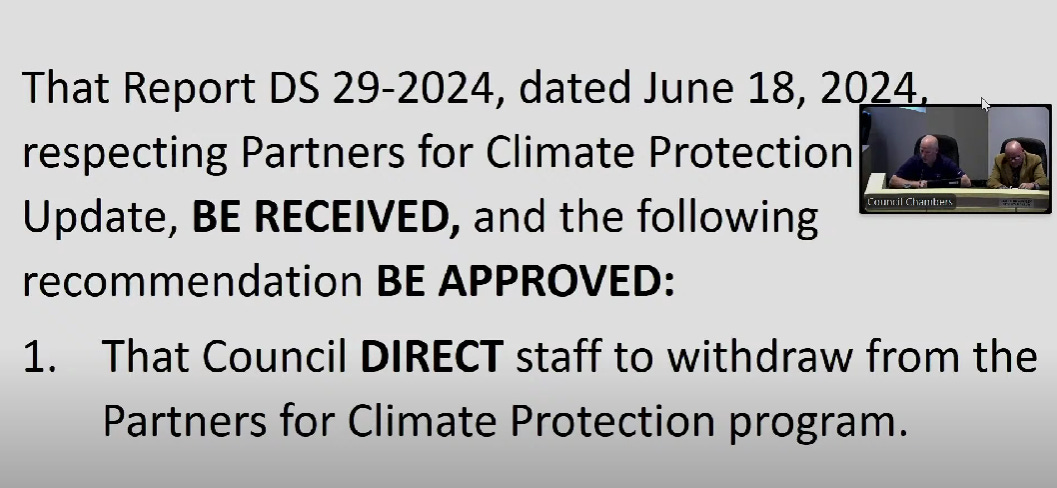Case Study: Thorold’s Withdrawal from the PCP Program
Key Concerns Raised by Thorold City Council and Community
Report to Canadian Municipalities: Key Concerns with the FCM’s Partners for Climate Protection (PCP) Program
Prepared for: Canadian Municipal Councils
Date: October, 12, 2024
Introduction
The Partners for Climate Protection (PCP) program is a joint initiative of the Federation of Canadian Municipalities (FCM) and ICLEI – Local Governments for Sustainability, launched in 1994 and funded in part by the Government of Canada. The program is proportedly designed to assist municipalities in reducing greenhouse gas emissions and addressing climate change at the local level through a structured five-step framework. This framework includes developing a greenhouse gas emissions inventory, setting reduction targets, creating a climate action plan, implementing the plan, and monitoring the results. To date, over 520 Canadian municipalities have participated in the program, representing over 70% of the Canadian population.
The Federation of Canadian Municipalities (FCM) presented the Partners for Climate Protection (PCP) program to Thorold’s city council with the intention of guiding the municipality through the process of reducing greenhouse gas emissions. However, the council's in-depth scrutiny raised multiple concerns, which should serve as a critical case study for other Canadian municipalities considering the program.
The presentation from the FCM, which administers the PCP program in collaboration with ICLEI, highlighted the general structure of the program but left several significant questions unanswered. These issues—ranging from clear conflicts of interest and cost transparency to liability waivers—were brought forward by the Thorold council and should be carefully considered by any municipality contemplating continued participation.
Key Concerns Raised by Thorold City Council and Community
Unclear Financial Burdens
During the presentation, FCM representatives stated that participation in the PCP program comes at no financial cost. However, as the Thorold council pointed out, the program involves substantial staff time and resources for tasks such as creating a greenhouse gas emissions inventory and implementing action plans. While the FCM offers technical tools and resources to assist, the true cost of implementation—in terms of both human resources and financial investment in green technologies—remains unclear. This is especially important for smaller municipalities with limited staff and budgets. The lack of cost details for previous municipalities that completed the program further complicated the council's decision-making process.No Direct Liability for FCM, ICLEI, or the Government of Canada
Thorold council members discovered a critical detail on the PCP program’s website: both the FCM, ICLEI, and the Government of Canada explicitly waive liability for the outcomes of the program. The statement on the site reads:
"Notwithstanding this support, the views expressed are the personal views of the authors, and ICLEI Canada, the Federation of Canadian Municipalities, and the Government of Canada accept no responsibility for them."
This information, which had not been included in the resolution when Thorold initially joined the program, raised serious concerns. The waiver of responsibility means that municipalities bear full responsibility for any financial or legal consequences resulting from the program's implementation.
The council strongly opposed this lack of accountability. Without any legal or financial assurances from FCM, ICLEI, or the Government of Canada, the risk falls entirely on local governments. This leaves municipalities vulnerable to financial or legal challenges if the program results in fiscal irresponsibility, promotes corporate interests over community needs, leads to privacy infringements, places unnecessary burdens on residents or landholders, or incurs unexpected costs or other harms.
Staff-Driven Recommendations: A Breach of Municipal Roles and Responsibilities
A major issue raised by Thorold’s council was that the decision to adopt the PCP program was placed on the council agenda by municipal staff, rather than initiated by the elected council, which is a violation of the Municipal Act. Under the Act, council is responsible for making policy decisions and setting the direction for the municipality, while staff are expected to provide advice and implement those decisions.
In this case, staff went beyond their advisory role by placing the PCP program on the council’s agenda without a clear directive from the elected officials. This action bypassed the normal process of council-driven decision-making, raising concerns about the erosion of democratic governance. Council members expressed frustration that such a significant policy recommendation—one that would commit the municipality to international sustainability goals—was not first deliberated or initiated by council itself.
This situation highlights broader issues with the PCP program’s international guidelines, which tend to influence local policy decisions. The program, supported by ICLEI, promotes global sustainability objectives, often requiring municipalities to alter how they are organized and operated (ICLEI, IDRC, & UNEP, 1996). When staff, who are more engaged with external programs like PCP, place such items on the agenda, it can lead to a shift from elected leadership to staff-driven governance. This dynamic makes it harder for municipalities to ensure that decisions are tailored to the specific needs of the community.
Thorold’s experience serves as a reminder of the importance of adhering to the Municipal Act’s separation of duties. Council members, as elected representatives, must retain the authority to shape the policy agenda and ensure that decisions are driven by local priorities, not external agendas. When staff-driven recommendations are placed on the agenda without council initiation, it undermines local autonomy and the proper democratic process.
Alignment with Local Priorities
Another major concern raised by Thorold's council was the potential misalignment of international goals with local priorities. The reduction targets set by the PCP program are influenced by international sustainability agendas. Thorold council and residents noted that these objectives often did not align with the town’s economic and environmental realities or its agricultural base. Many of the mandates would have placed significant financial strain on the municipality, and their relevance to Thorold’s unique local context was questionable.Additionally, councillors pointed out that they were already contributing to regional, provincial, and federal climate initiatives, making additional financial burdens from the PCP program unnecessary and duplicative.Lack of Transparency in Long-Term Commitments
The PCP program’s five-step framework includes creating emissions inventories, setting reduction targets, and implementing local climate action plans. However, Thorold council members expressed frustration over the program’s lack of transparency regarding long-term costs and commitments. They raised concerns about how the program’s ongoing requirements could strain municipal resources, especially if long-term sustainability initiatives required continuous investment.Absence of ICLEI Representatives at the Presentation
Thorold’s council requested the presence of a representative from ICLEI during the presentation on the PCP program, as ICLEI is a key technical partner providing crucial support for sustainability projects. However, no representative from ICLEI attended the meeting, leaving several important council questions unanswered—particularly those concerning ICLEI’s role and influence over municipal decision-making. This lack of representation only deepened the council’s concerns regarding the transparency and accountability of the program’s administration.
Additionally, ICLEI’s involvement in the PCP program raises broader concerns. Founded by the United Nations, ICLEI was instrumental in writing the Local Planning Guide for Agenda 21, a comprehensive framework for sustainable development adopted internationally. More concerning is ICLEI’s corporate backing—the organization receives significant funding from Google, a company in which BlackRock and Vanguard own substantial shares. These corporations are also deeply invested in green tech and smart tech companies, creating a clear conflict of interest when ICLEI is involved in both data management and policy recommendations for municipalities.
This relationship creates potential issues of corporate influence over municipal decision-making. The same entities that stand to benefit financially from the sale of green technology and smart infrastructure are also responsible for guiding municipalities on how to structure and implement these technologies. By not addressing these concerns, the absence of an ICLEI representative only reinforced the council’s fears that the program might be driven more by corporate profits than by local needs and community interests. This situation underlines the need for full transparency and accountability in the governance of any program that directly impacts municipal autonomy and decision-making.
Case Study: Thorold’s Withdrawal from the PCP Program
In response to the concerns outlined above, Thorold’s city council decided to withdraw from the PCP program at the end of the one-year trial period. After evaluating the program's tools and resources, assessing the time commitment, and reviewing potential costs, both staff and the council concluded that the PCP program’s international objectives did not align with Thorold’s local priorities.
Recommendations for Other Canadian Municipalities
Thorold’s experience with the PCP program serves as an important lesson for other municipalities to reconsidering participation. Based on Thorold’s findings, we recommend that municipalities withdraw from the PCP program and focus on local envirnmental stewardship programs.
Conclusion
Thorold’s withdrawal from the PCP program underscores the need for municipalities to thoroughly evaluate the financial, legal, and operational impacts of participating in such programs. While environmental responsibility is and important, municipalities must ensure that any initiatives they endorse are locally relevant, transparent, and financially viable. By carefully considering the issues raised by Thorold’s experience, other Canadian municipalities can make more informed decisions about whether to continue participation in the PCP program.
For more information on Thorold’s experience or additional guidance on evaluating sustainability programs, please contact: Maggie Braun, Civic Advocate for Local Envrionemental Stewardship at info@kiclei.ca.








Great work, Maggie Braun and company. You've made the common sense response to ICLEI based on facts and not emotion.
Great work by Thorold participants to set up this great overview of concerns as a model for other municipalities, with so many specifics clearly identified. Again, thank you to MHB and Gather 2030.